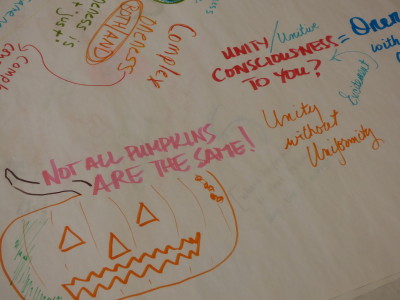I have been thinking a lot about this lately. What to do when harmful behavior in an individual shows up in a participative event. When it feels like an individual is hijacking attention. When it feels like an attack.
Intervene? Let it rides it’s course? Make sure that chairs don’t get thrown? Sustain the tension and uncertainty so that something new can come from how the rest of the group responds? Challenge others to speak their truth? Sustain the tension so that the group can respond and deal with it’s business. All of these can help in some way.
In times like these, I find myself aware of recent teachings that I got from Christina Baldwin. First, that there is a difference between shadow (an unspoken tension or projection of judgement that is present) and sabotage (willful disruption of the group and process for personal means). Second, that if it’s shadow, part of the facilitator’s job is to pull the shadow off of the person willing to speak it into the group. OK, that all requires some discernment, on the spot, and some good skill. That’s some of the nuance.
But, back to harmful behavior, and one option that I want to try next time.
The first thing to do is name that the behavior appears to be harmful. Be transparent with it and dare to name it out loud. “What you are saying appears to be a very harmful thing. It feels like an attack on a particular person. I imagine that there is some good that you are intending. Is there? Can you say what is the good that you are trying to point towards with this behavior?”
This takes the behavior head on. Is an act of kindness to the person speaking. Is an act of kindness to the person being attacked. It is an act of kindness to the group, to use what is present for some changes.
The second step is to invite a broader inquiry. “Can you imagine that there may be other ways to accomplish that good? Would you be willing to enter a dialogue about that?”
This creates alternative to burying the shadow, and unintentionally creating further resentment. It creates an opportunity for wisdom from the group. It counts on the group to bring forth wisdom around the caring. To bring forth wisdom around alternative choices, which I would argue, are always present.
I suppose there is something further in this will be for attention another day. As facilitator, I’ve got some plans for the group. Hijacking interferes with that. It is useful to name that that disturbance, even that harmful behavior, is entry point to needed work. It can really clear the room.
Yes, there are choices.

